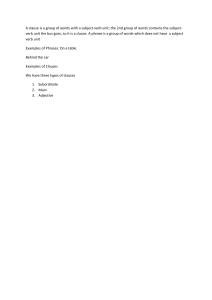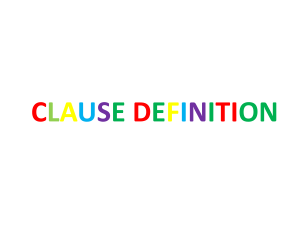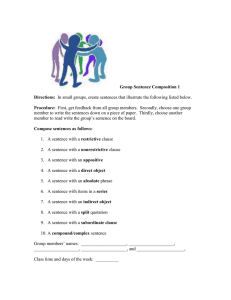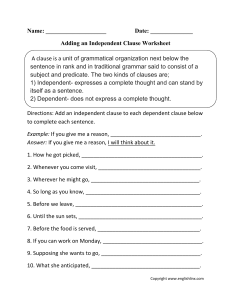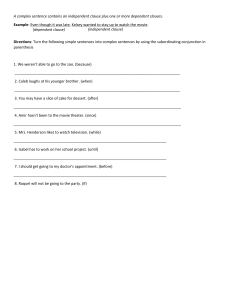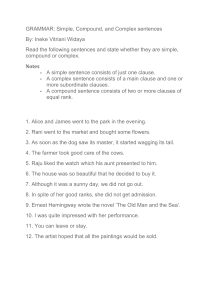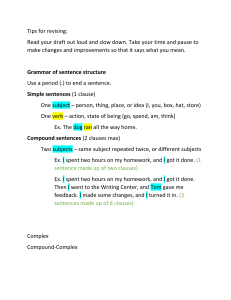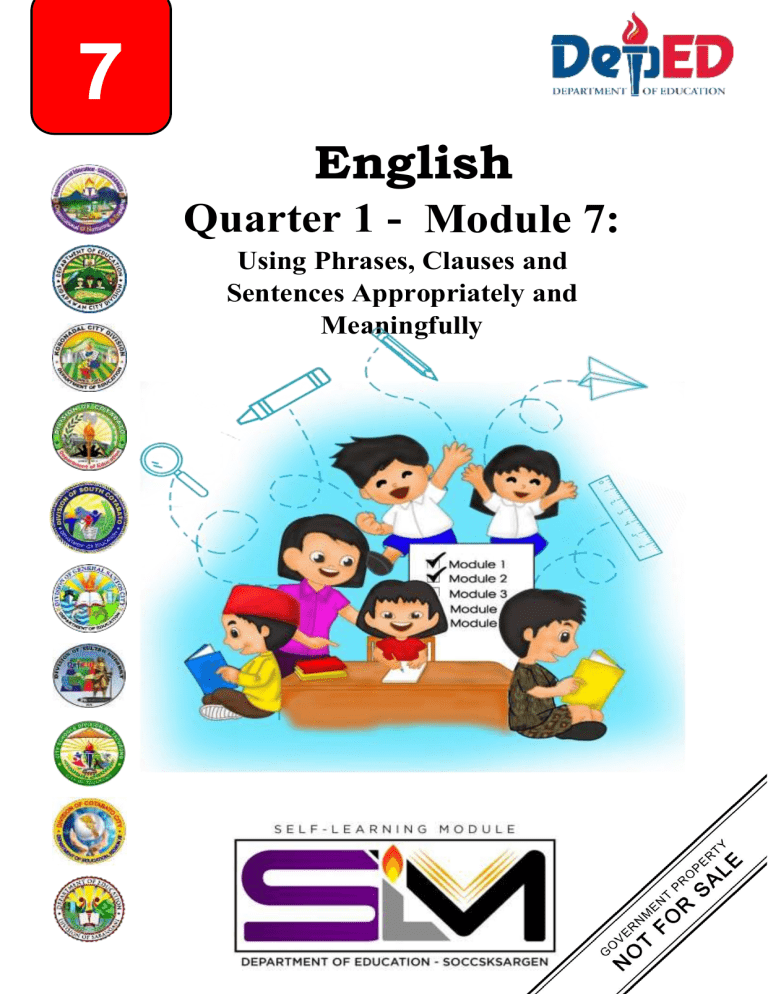
7 English Quarter 1 - Module 7: Using Phrases, Clauses and Sentences Appropriately and Meaningfully 2 English – Grade 7 Self-Learning Module (SLM) Quarter 1 – Module 7: Using Phrases, Clauses and Sentences Appropriately and Meaningfully First Edition, 2020 Republic Act 8293, section 176 states that: No copyright shall subsist in any work of the Government of the Philippines. However, prior approval of the government agency or office wherein the work is created shall be necessary for exploitation of such work for profit. Such agency or office may, among other things, impose as a condition the payment of royalties. Borrowed materials (i.e., songs, stories, poems, pictures, photos, brand names, trademarks, etc.) included in this module are owned by their respective copyright holders. Every effort has been exerted to locate and seek permission to use these materials from their respective copyright owners. The publisher and authors do not represent nor claim ownership over them. Development Team of the Module Writer: Jelyn A. Palmes Editors: Catherine G. Sua and Grace T. Lumingkit Reviewers: Evelyn C. Frusa, PhD, Delia B. Mabalot, Rolex H. Lotilla, Arvin M. Tejada Illustrator: Iza May S. Agrazamendez Layout Artist: Arianne N. Tagolino Management Team: Carlito D. Rocafort, CESO V – Regional Director Rebonfamil R. Baguio, CESO V – Assistant Regional Director Crispin A. Soliven Jr. CESE - Schools Division Superintendent Roberto J. Montero CESE - Assistant Schools Division Superintendent Gilbert B. Barrera – Chief, CLMD Arturo D. Tingson Jr. – REPS, LRMS Peter Van C. Ang-ug – REPS, ADM Gerardo O. Magno- REPS – English Belen L. Fajemolin PhD - CID Chief Evelyn C. Frusa PhD – EPS - LRMS Bernardita M. Villano - ADM Coordinator Delia B. Mabalot – EPS- English Printed in the Philippines by Department of Education – SOCCSKSARGEN Region Office Address: Regional Center, Brgy. Carpenter Hill, City of Koronadal Telefax: (083) 2288825/ (083) 2281893 E-mail Address: region12@deped.gov.ph 3 Introductory Message This Self-Learning Module (SLM) is prepared so that you, our dear learners, can continue your studies and learn while at home. Activities, questions, directions, exercises, and discussions are carefully stated for you to understand each lesson. Each SLM is composed of different parts. Each part shall guide you step-by- step as you discover and understand the lesson prepared for you. Pre-test are provided to measure your prior knowledge on lessons in each SLM. This will tell you if you need to proceed on completing this module, or if you need to ask your facilitator or your teacher’s assistance for better understanding of the lesson. At the end of each module, you need to answer the post-test to self-check your learning. Answer keys are provided for each activity and test. We trust that you will be honest in using these. In addition to the material in the main text, Notes to the Teachers are also provided to the facilitators and parents for strategies and reminders on how they can best help you on your home-based learning. Please use this module with care. Do not put unnecessary marks on any part of this SLM. Use a separate sheet of paper in answering the exercises and tests. Read the instructions carefully before performing each task. If you have any question in using this SLM or any difficulty in answering the tasks in this module, do not hesitate to consult your teacher or facilitator. Thank you. 4 What I Need to Know Writing is one way to help you say clearly what you think or how you feel about people, places, events or experiences. The words in the sentence must be in the right order to make sense. You’ll need to have a working knowledge of subjects, predicates, and objects before you continue. Learning Objectives After working on the activities in the module you will be able to: 1. Define phrase, clause and sentence 2. Differentiate phrase, clause and sentence from one another 3. Construct sentences using clauses and phrases Most Essential Learning competency (MELC) At the end of this learning module, student requires skill in using phrases, clause sand sentences appropriately and meaningfully. What I Know The Sentence is the largest grammatical unit in the English Rankscale and it refers to a group of words that begins with a capital letter and ends with any of these three punctuation marks: the period or full stop, the exclamation mark and the question mark. A simple sentence is one which has one main or independent clause. Examples: • This is my food. • I love you so much. • Choco has gone home • Cathy bought a book this morning. • The hardworking farmer reaped a bumper harvest last year. Sentence has two parts; the subject, and the predicate. The subject refers to the part of sentence that tells who or what the sentence is about. Example: Kelly is walking down the street. My friend wants to see a movie. She looks good. 5 The sentence consists of a verb and a subject expressing a complete thought. There are no dependent clauses, only a single independent clause forms a simple sentence. For example- He ate an orange. The cat died. It is important to note that we do not determine whether a sentence is simple by how long or short it is. A sentence could be short and not be a simple sentence while another may be very long and still be a simple sentence. The predicate tells what the subject does with an action verb or describes the subject using a linking verb and a complement. Example: Kelly is walking down the street. Let us see if you already know something that we are about to discuss. Answer the pre-test on Phrases/Clauses/Sentences. Task 1 Copy each of the following sentences on your activity notebook. Underline the subject and encircle the predicate. 1. Ana is cooking spaghetti. 2. The children are playing scrabble. 3. Avocado is my favorite fruit. 4. Reading is my hobby. 5. My teacher smiles at me. 6. I am worried now. 7. Teach me how to drive. 8. Are you afraid of the dark? 9. Daniel looks happy today. 10. We will attend the meeting this afternoon. Task 2 Copy each of the following sentences on your notebook. Identify whether the group of words is a sentence, a phrase or a clause. Write your answer on the space provided for. _____ _____ _____ _____ _____ _____ _____ 1. 2. 3. 4. 5. 6. 7. My grandma's house _____ 8. When she got home. I love singing and dancing _____ 9. My sister got fainted When the saints go marching in _____ 10. In the school We were discussing modules on the table Leaving behind the dog Smashing into a fence She wanted to talk to my sister 6 Lesson 1 Using Phrases, Clauses, and Sentences appropriately and meaningfully Clauses and phrases are the building blocks of sentences. Every sentence must have at least one clause to be considered grammatically correct. You’ll need to have a working knowledge of subjects, predicates, and objects before you continue. A sentence is word or group of words that expresses a complete thought or idea. Typically a sentence contains a subject and a predicate. There are various kinds of sentences according to structures of the sentence. To know the various kinds of sentences according to structure it is important to know what clauses are. Once the concept of a clause is clear in one’s mind they will have no difficulty in understanding the different kinds of sentences according to structure. When communicating we need to be able to convey the message in an appropriate manner so that we will have meaningful communication. In this lesson you will learn how to use phrases, clauses and sentences appropriately and meaningfully. What’s In Remember your previous lesson on the direct speech and reported speech. Hope you paid attention to that lesson because it will really come in handy with our new lesson today. Let’s check your memory shall we? Task 3: Copy the following on your activity notebook. Underline the group of words if it is a sentence and circle if it is a phrase. 1. John hit 2. Sam and Sherry went to class 3. Go to the movies 4. The animals live in the forest 5. Happy day 7 6. Jump for joy 7. The show keeper showed the animal 8. All day 9. I played basketball today 10. I also enjoy playing baseball Task 4: Copy the following sentences on your activity notebook. Write YES if the underlined words in each sentence is a phrase and No if it is not. Write your answer on the space provided each number. ____ 1. He was waiting for the rain to stop. ____ 2. She was upset when it didn't boil. ____ 3. You have been sleeping for a long time. _____4. You might enjoy a massage. _____5. He was eager to eat dinner. _____6. Ivory is diligent in her studies. _____ 7. Elvis always asks me a food. _____ 8. They want me to go with them. _____ 9. Maxene is a nice pet. _____ 10. Are you done? Were you able to answer the items correctly? What is the difference between the clause and the phrase? Phrase – words can be grouped together, but without a subject or a verb. A phrase is a group of words related to the subject, predicate, or object. Phrases do not contain a subject and a predicate, or we would call them clauses. Phrases provide additional information about subjects, predicates, and / or objects, and understanding how they work is helpful to building an analyzing sentence. Example: After working late into the night, Jack fell asleep on his desk. The emboldened portion of the sentence exemplifies the phrase. It provides additional information about our subject, Jack, but the sentence does not require this information to be grammatically complete. I left my keys inside of the Whole Foods, my favorite grocery store. In this example sentence, the predicate is left and the subject is I. 8 On the other side of the sentence we have a phrase that provides additional information about the object of the sentence Whole Foods. Note that a phrase can come at the beginning, middle, or end of a sentence. Example: 1. After dinner 2. Waiting for the rain to stop On the other hand, the clause-are group of words that have both subjects and predicates. Unlike phrases, a clause can sometimes act as a sentence. This type of clause is called an independent clause. This isn’t always the case, and some clauses can’t be used on their own – these are called subordinate clauses, and need to be used with an independent clause to complete their meaning. An example of a subordinate clause is “When the man broke into the house” An example of an independent clause is “the dog barked at him” While clauses, phrases and sentences might seem very similar at first, on closer look you can start to see how they function very differently. To make sure you use them correctly, it’s important to practice identifying them. What’s New Let’s find out the use of phrases, clauses and sentences appropriately and meaningfully. Let’s go! Direct Speech Reported Speech Is the exact words Is the exact meaning of what someone Someone said Said but not in the exact words. We use quotation marks in direct speech We do not use quotation marks in reported speech Example: He said, “I’ll wait for you.” He said that he would wait for me. 9 On the table above, you can see the difference between the direct speech and reported speech. As we go on with our lesson, be ready to form sentences using phrases and clauses. New York is known as “The City That Never Sleeps.” Read the lyrics of the song and find out why: Song: New York, New York By: Frank Sinatra Start spreading the news, I’m leaving today I want to be a part of it__ New York, New York These vagabond shoes, are longing to stray Right through the very heart of it __ New York, New York I wanna wake up in a city that doesn’t sleep And find I’m king of the hill__ top of the heap These little town blues, are melting away I’ll make a brand new start of it in old New York If I can make it there, I’ll make it anywhere It’s up to you __New York, New York Task 5: Copy the table below and write your answers in your notebook. Classify the underlined words above whether they have a complete or incomplete thought. STATEMENTS WITH COMPLETE THOUGHT 10 STATEMENTS WITHOUT COMPLETE THOUGHT What is It Now, you are ready to take off to explore deeper analysis on a phrase, a clause and a sentence. Try to check whether your answers and observations on the previous activity match with the answers below. Statement A Statement B Statements with complete thought Statements without complete thought 1. I’m leaving today. 4. If I can make it there 2. I want to be a part of it. 5.These vagabond shoes 3. It’s up to you. 6.in old New York Let’s take a look at statements 1 I’m leaving today, 2 I want to be part of it and statement 3 It’s up to you from the table above, these statements have a complete thought and they are called Independent Clause or Simple Sentence. An independent clause is a group of words that contains both a subject and a predicate. It expresses a complete thought and can stand alone as a sentence. It can also be joined to other dependent or independent clauses to make a more interesting and complex sentence. Examples: I enjoy sitting by the fireplace and reading. Waiting to have my car's oil changed is boring. She wants to travel the world and see wonderful sights. Our planets revolve around the sun. Now let’s take a look at statement 4 from the table above. That statement also does not have complete thought though they have a subject and a predicate. This statement is what we call a Dependent Clause. A dependent clause is a group of words that has both a subject and a verb but (unlike an independent clause) cannot stand alone as a sentence. It's a clause that implies that there is more to come and is incomplete. Examples: Although she is hungry … Whoever is hungry … Because I am feeling well 11 The statements in column A do not have complete thoughts. Do you know what these group of words are? Let’s take a look at statements 5 and 6 in the table, these group of words are called phrases. A phrase refers to a combination of two or more words, that are related to one another and acts as a single unit, but does not contain a subject-verb pairing. It forms a part of a clause or sentence which is used to provide further information. A phrase does not carry any meaning of its own, due to the absence of subject and verb, but it clarifies the context, of the sentence when added to a clause. Note: There are two types of words that can be used as connectors at the beginning of an independent clause: coordinating conjunctions and independent marker words. A. Coordinating conjunctions coordinate or join two or more sentences, main clauses, words, or other parts of speech which are of the same syntactic importance. Also known as coordinators, coordinating conjunctions are used to give equal emphasis to a pair of main clauses. Coordinating conjunctions always connect phrases, words, and clauses. For example: This batch of mushroom stew is savory and delicious. The fact is, you can begin sentences with coordinating conjunctions as long as you follow these three rules for doing so: • Ensure that the coordinating conjunction is immediately followed by a main clause • Don’t use coordinating conjunctions to begin all of your sentences. Do so only when it makes your writing more effective. • Although commas typically follow coordinating conjunctions used in areas other than the beginning of a sentence, they should not be used after coordinating conjunctions used to open sentences unless an interrupter immediately follows. The seven coordinating conjunctions used as connecting words at the beginning of an independent clause are and, but, for, or, nor, so, and yet. When the second independent clause in a sentence begins with a coordinating conjunction, a comma is needed before the coordinating conjunction: 12 Examples: 1. You can eat your cake with a spoon or fork. 2. My dog enjoys being bathed but hates getting his nails trimmed. 3. Bill refuses to eat peas, nor will he touch carrots. 4. I hate to waste a drop of gas, for it is very expensive these days. 5. Jim studied in the Sweet Shop for his chemistry quiz, but it was hard to concentrate because of the noise. B. Independent Marker Word An independent marker word is a connecting word used at the beginning of an independent clause. These words can always begin a sentence that can stand alone. When the second independent clause in a sentence has an independent marker word, a semicolon is needed before the independent marker word. A dependent clause cannot be a sentence. Often a dependent clause is marked by a dependent marker word. When Jim studied in the Sweet Shop for his chemistry quiz . . . (What happened when he studied? The thought is incomplete.) Jim studied in the Sweet Shop for his chemistry quiz; however, it was hard to concentrate because of the noise Some common independent markers are: also, consequently, furthermore, however, moreover, nevertheless, and therefore. Example: My mother is sleeping; however my father is reading a book. Independent marker words are another way to connect clauses. These words are used at the beginning of an independent clause. In this part of the lesson, it is your task to practice what you have learned from the previous activities and discussions. Be sure to read all the instructions carefully and answer correctly what is being asked in each of the task. Be ready with your paper and pen. 13 What’s More! Task 5: Write IC if the statement is independent clause and DC if it is dependent clause. Write your answer before the number. 1. 2. 3. 4. 5. 6. 7. 8. 9. 10. Whenever I look deeply into your eyes. I get dizzy. Because these premises have been burglarized every night. The campus is celebrating spring with the confusion of construction. Which is the perfect solution to every problem. While the mouse, who was a perfect house guest, shrank modestly into the corner. As I leaped across the canyon. I thought of each incident in my past life. The hat that I will wear. If I tell you the truth about this question. Task 6: Identification Identify whether the group of words is a phrase, a dependent clause, or an independent clause/simple sentence. 1. 2. 3. 4. 5. 6. 7. 8. 9. 10. My friend was at my grandma's house. We were watching TV while peeling the peanuts. The old brown one When the phone rang Jan wanted to talk to Cathy. My sister’s friend Almost fainted Who walk on the gym I'm not really a fan of Kathniel. The mall was packed with XO fans. 14 Task 7: Matching Type Match the sentence in column A with the sentence in column B to have a complete sentence. Column A 1. The beach is a lot of fun. Column B A. and the test is on Friday. 2. A group of us went to the movie. B. but I forgot to bring my shopping list 3. I went to the store. C. but I need to rest 4. He went to the theme park. D. and he went on all the rides 5. I really wanted potato soup E. but the café served clam chowder 6. Today is Thursday. F. and we agreed it was enjoyable 7. She had just bought two gorgeous dresses. G. so she needed to get matching shoes. 8.I really want to see the game. H. but the mall is having a huge sale today 9. I went to the Department of Motor vehicles today. I. For Frank brought the main dish 10. Monica brought the drinks. J. And I took the written driving test. K.Yet the mountains are better 15 What I Have Learned CONGRATULATIONS! You have done a great job. I believe that you have a clear idea now on how to use phrases, clauses and sentences appropriately and meaningfully. Complete the statements below to show how much you have learned from this lesson. Ready? Okay! A . Fill in the blank with the correct word to completethe sentence. 1._______is described as a group of two or more than two words related to one another that constitute a single 2.________ . On the other extreme, the3.________ is a part of a sentencethat contains a subject (noun phrase) that actively performs an action (finite verb form). A 4.________ is a part of a clause o r a _5.__________ . As against, a clause is a sentence fragment. A clause has a6._________ and 7._________, whereas a phrase doesn’t. A phrase cannot stand-alone, as it does not convey meaning. In contrast, when a clause is an8.__________ clause it is astandalone statement, which conveys a thought or idea, but if it is a 9._______ clause, it is not a stand -alone statement, as it requires something else to 10. _______ it. 16 Task 8: B. Fill in the blanks with a phrase or a clause to complete the sentence. 1. Summer has been extremely hot, but I think ______________________________________________________________________. 2. Because my car has no air conditioning, I’ve been _________________________________________________________________. 3. __________________, we shall all be complaining about the cold weather. 4. Fred was concerned about his daughter’s cough; however, it turned out to be __________________________________________________________________ ____. 5. Her alarm didn’t go off this morning because ______________________________________________________________________. What I Can Do It is now your chance to show off your expertise by applying the rules of clauses, phrases and sentences. Directions: Copy the sentences on your notebook. Put a comma to complete the meaning of a sentence. 1. Before you begin dinner you should clean the kitchen. 2. Once people have tasted freedom they have a difficult time surrendering to confinement. 3. I will type my paper before I read my history chapter. 4. Although the outcome of the election is uncertain an improvement in the country’s economy is expected. 5. I cannot imagine when the change will take place. 6. I will go on the trip with you even though I am terrified of flying. 7. As English grammar is often complex students must study the concepts diligently. 8. While the likelihood of winning the Lottery is rare too many people squander their money on tickets. 9. Mimi laughed at the joke after she understood its punch line. 10. You will not be able to escape from this prison unless you sprout wings 17 Task 9: Expressing yourself A. Make a paragraph using a phrase, a clause and a sentence stating what you are doing inside your house during quarantine. Please follow the Rubric below as your guide. __________________________________________________________________________________ __________________________________________________________________________________ __________________________________________________________________________________ __________________________________________________________________________________ __________________________________________________________________________________ __________________________________________________________________________________ 18 Rubric for Evaluation of the Paragraph B. Each of these proverbial saying contains an adverbial clause. Identify the adverb clause in each sentence by underlining it. 1. While the cat is away, the mice will play. 2. A lie travels around the world while truth is putting her boots on. 3. If you don’t know where you are going, any road will get you there. 4. Memory is deceptive because it is colored by today’s events. 5. Never look down on anybody unless you’re helping him up. Assessment Excellent! You are now on the last stage of this module. Let us see how well you digested everything discussed in this lesson. Be ready with a paper and pen. Task 10: Directions: Combine the independent clause using the given conjunctions. (and, so) 1. The circus came to town. Tickets were cheap. I decided to go with my friend. ________________________________________________________________________________ ________________________________________________________________________________ (but, so) 2. The clowns drove up in a little car. There were a bunch of them. I didn’t think they would all fit. ________________________________________________________________________________ ________________________________________________________________________________ (while, now)3. A guy stuck his head in the lion’s mouth. Bears were dancing in tutus. An elephant rode a bike. ________________________________________________________________________________ ________________________________________________________________________________ (so, but) 4. A man with a whip was beating the animals. The animals were sad. The man fed them a snack. ________________________________________________________________________________ ________________________________________________________________________________ (and, so) 5. I always have fun at the circus. A lady was selling snacks. I bought popcorn and cotton candy. ________________________________________________________________________________ ________________________________________________________________________________ Hey there! Now that you are done with our lesson today, you can use phrases and clauses in forming sentences. Think wisely. Enjoy! Additional Activities Task 11: Directions: Use phrases and clauses in writing sentences. 1. When we got there, the mall was packed with Dance Boy fans. ________________________________________________________________________________ ________________________________________________________________________________ 2. Everyone wore Dance Boy shirts except me because I hate the Dance Boys. ______________________________________________________________________________ ______________________________________________________________________________ 3. While the Dance Boys sang, Jan danced, but I played games on my cell phone. ________________________________________________________________________________ ________________________________________________________________________________ 4. I challenged one of the Dance Boys to a dance battle but he was scared. ________________________________________________________________________________ ________________________________________________________________________________ 5. Since we went to the mall, I've been working on my moves, but I'm still bad ______________________________________________________________________________ ______________________________________________________________________________ Answer Key References: Difference between phrase and clause. (2020, January 25). Key Differences. https://keydifferences.com/difference-between-phrase-and-clause.html. Fact sheet Direct Speech and Reported Speech. [Ebook]. Retrieved 02 June 2020 from http://www.dorcan.co.uk/media/literacy/Parts_of_Speech/Parts_of_SpeechFact _Sheet_Direct_Speech_and_Reported_Speech.pdf Past Perfect Tense | ENGLISH PAGE. Retrieved 30 May 2020, from https://www.englishpage.com/verbpage/pastperfect.html Robart, K. Quoted and Reported Speech (Direct and Indirect Speech) [Ebook]. Retrieved 30 May 2020 from https://www.sjsu.edu/ajeep/docs/QuitedandReportedSpeech.pdf Ph.search.yahoo.com. 2020. Clauses And Phrases - Avast Yahoo Search Results. [online] Available at: <https://ph.search.yahoo.com/yhs/search?hspart=avast&hsimp=yhssecurebrowser&type=4150&param1=176d1704f2af452d8144e1f50fd6b976&para m 2=20180719&param3=Avast%20Secure%20Browser|81.0.4127.130&param4=17 | PH|1.18.16.597|1.18.16.597&p=clauses+and+phrases> [Accessed 30 May 2020]. DISCLAIMER This Self-learning Module (SLM) was developed by DepEd SOCCSKSARGEN with the primary objective of preparing for and addressing the new normal. Contents of this module were based on DepEd’s Most Essential Learning Competencies (MELC). This is a supplementary material to be used by all learners of Region XII in all public schools beginning SY 2020-2021. The process of LR development was observed in the production of this module. This is version 1.0. We highly encourage feedback, comments, and recommendations. For inquiries or feedback, please write or call: Department of Education – SOCCSKSARGEN Learning Resource Management System (LRMS) Regional Center, Brgy. Carpenter Hill, City of Koronadal Telefax No.: (083) 2288825/ (083) 2281893 Email Address: region12@deped.gov.ph
